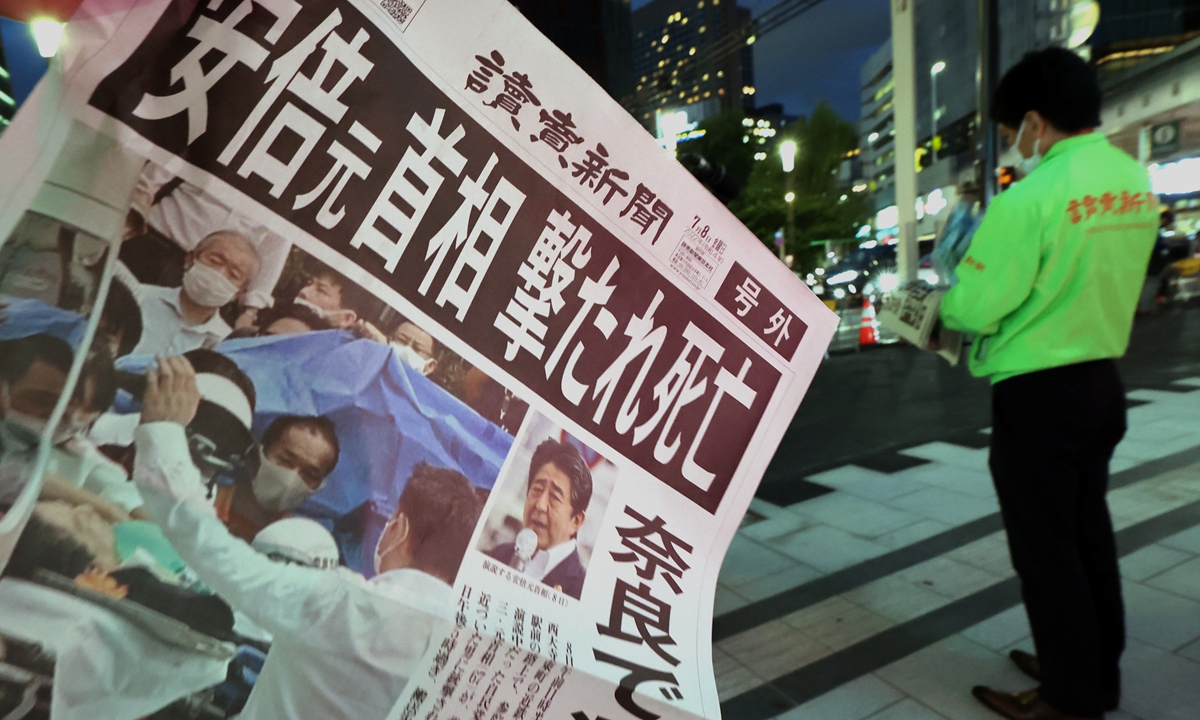
Photo: CFP
After the assassination of former Japanese Prime Minister Shinzo Abe on July 8, the suspect, Tetsuya Yamagami, said the link between Abe and a religious group that crippled his family's finances was a motive for his fatal shooting of Abe. But Japanese media and official side have tried to conceal the identity of the group.Mainstream Japanese media didn't discuss this fact until international news agencies disclosed that the group is in fact the Unification Church, headquartered in South Korea, which the suspect believed was brought to Japan by Abe's grandfather Nobusuke Kishi in the 1960s, with the head of the church's Japan branch later acknowledging at a news conference that Yamagami's mother was a member.
The details of the case have not only caused international public opinion to pay attention to collusion between Japanese politicians and fringe religious groups such as the Unification Church, but have also made people start to think about the poisonous influence and destruction of ill-intentioned religious groups and cults on a country's society and politics.
This also prompts me to think: If Yamagami lived in China, would he be forced into a dead alley by bad religious forces or cults, and ended up on a path of self-destruction?
The answer is apparently no. If Yamagami lived in China, our government would have definitely helped him seek justice, punish the evil religious forces that caused his family to break up and his mother to go bankrupt, and even eradicated this religious group.
As a journalist who has reported on many cases involving cults in China, I am pretty aware of the zero-tolerance attitude that China has always maintained toward evil religious forces and cults, and the efforts that China has put in this regard.
From the Falun Gong to Eastern Lightning, none of those cults that violated human rights, destroyed families, endangered society and even shook the country have escaped punishment They have been completely eradicated in China.
However, those cults have found new breading grounds in Japan, South Korea and the US. These governments have distorted China's efforts as "persecution of religious freedom." For the purpose of demonizing China, they have acted as a shield for cult leaders who dismantled many families and swept away large sums of money from the victims.
For example, Zhao Weishan, founder of the cult Eastern Lightning, fled to the US in 2000.
Cults such as Falun Gong, under the protection of the US government, now have imitated the Unification Church's development route and colluded with US right-wing conservative forces, which have even begun to shake US democratic politics.
Although China has cracked down on evil religious forces and cults with an iron fist, it is still facing great challenges.
Although organizations and individuals openly infringing on the interests of the public in the name of religion have rarely emerged in recent years, some spiritual groups with obvious cult characteristics have begun to spread taking advantage of the epidemic and the internet. They are holding a banner of "promoting traditional culture" or "patriotism," but carrying out criminal activities such as illegal fundraising and fraudulence, as well as mind control like cult does. They are breaking up families and demanding followers not to seek medical treatment when they are sick.
Fortunately, law-enforcement agencies are paying close attention to those organizations and relevant authorities are continuously carrying out education on the public warning them against such organizations. Some places also have taken actions to crack down on and eradicate them.
In China, evil can never prevail over good no matter how bad religious forces, cults or spiritual organizations change.
The author is a reporter with the Global Times. opinion@globaltimes.com.cn

